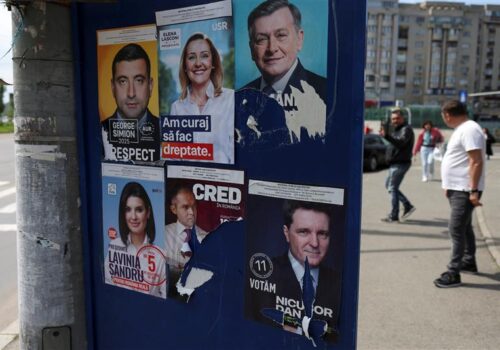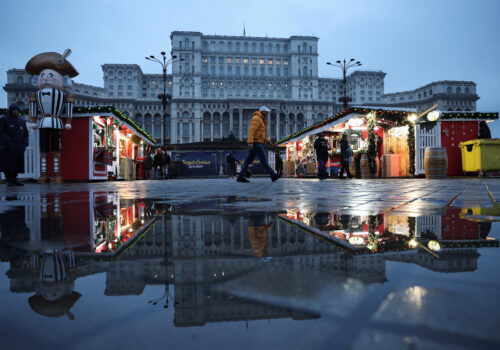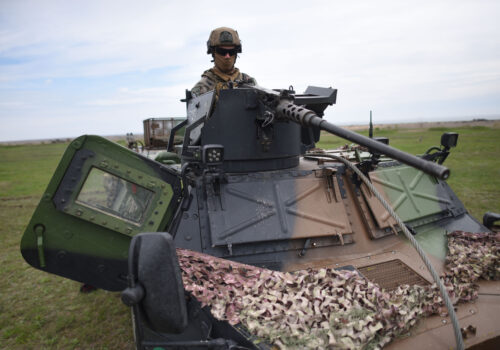Why Romania chose centrism in the end
JUST IN
Dan’s the man. Bucharest Mayor Nicusor Dan won Sunday’s Romanian presidential election, a triumph for centrist, pro-European forces in a country that has been roiled by six months of electoral upheaval. “We need to build Romania together irrespective of who you voted for,” Dan told cheering supporters. His populist, far-right challenger, George Simion, claimed fraud and initially claimed victory, but conceded hours later. This election followed a canceled presidential race in December, when Romanian authorities determined that another populist, far-right candidate, Calin Georgescu, had violated campaign-finance rules and was the beneficiary of a dodgy social media campaign; he was later barred from running again. How did Dan triumph? What can we expect next for Romania and for the country’s relations with the world? We turned to our experts to parse the polls.
TODAY’S EXPERT REACTION BROUGHT TO YOU BY
- Victoria Olari (@Olari_Victoria): Research associate at the Digital Forensic Research Lab
- Daniel Fried (@AmbDanFried): Weiser Family distinguished fellow and former US assistant secretary of state for Europe
- Anca Agachi (@AncaAgachi): Nonresident fellow with the Transatlantic Security Initiative and defense policy analyst at the RAND Corporation
Why Dan won
- Dan may be a centrist, but he was not the chosen candidate of Romania’s ruling coalition. “Romanian voters sent a loud message: They reject the old political elite,” Victoria says. “Both Dan and Simion positioned themselves as anti-system challengers, capitalizing on widespread frustration with corruption and governance failures.”
- But at the same time, “the preference for an outsider didn’t translate into preference for a nationalist or anti-EU firebrand, which is how Simion ran his campaign,” Daniel tells us. Instead, voters picked a mathematician who “ran a campaign that was pro-Europe, pro-NATO, and pro-Ukraine.”
Sign up to receive rapid insight in your inbox from Atlantic Council experts on global events as they unfold.
The foreign factor
- While Russia appeared to back Simion, Daniel points out that Simion “maintained distance from Russian President Vladimir Putin (wise in Russo-skeptic Romania).”
- Instead, the populist candidate courted US President Donald Trump’s Make America Great Again movement, traveling to the Conservative Political Action Conference and appearing on Steve Bannon’s podcast. “But this did not translate into support at home,” Daniel notes.
- Victoria points out that on Sunday, Simion’s supporters “flooded social media with accusations of fraud and amplified fake news stories that mimicked legitimate outlets and falsely declared Simion the winner.” Simion and his backers also accused the presidents of both Moldova and France of meddling in the election. “These actions risk deepening Romania’s societal polarization,” Victoria says.
- But Simion did concede in the end, turning the focus to what Dan’s win will mean for the region. Victoria notes that Dan’s pro-Ukraine stance “strengthens regional security and support for Kyiv.” Dan’s victory will also boost neighboring Moldova’s integration efforts with the European Union, she adds, “fostering closer Romania-Moldova ties and countering Russian influence.”
Romania’s road ahead
- While Romanians “made it clear” with their vote that “they are European,” Dan’s mandate will still be “an incredibly difficult one,” Anca cautions, as the newly elected president will need to choose a prime minister to form a pro-European political coalition in the parliament, where far-right parties hold one-third of the seats.
- His immediate task will involve building trust in an economy with the highest budget deficit in the European Union (as a percentage of gross domestic product), while guiding foreign policy “at a time when the regional context for Romania has never been more dangerous, given Russia’s continued war in Ukraine,” Anca says.
- To succeed in the long run, “Dan will have to face down the unaddressed root causes of discontent,” Anca says—such as poverty, corruption, and distrust of state institutions—“that gave oxygen to far-right parties in the first place and brought Romania to the brink of disaster.”
Further reading
Wed, May 7, 2025
Your primer on the Romanian presidential election
Eye on Europe's elections By
Ahead of the second round on May 18, our experts are breaking down the race and its potential impacts on Romania’s foreign policy.
Mon, Dec 16, 2024
Dispatch from Bucharest: Why has Romanian politics suddenly gone sideways?
New Atlanticist By Daniel Fried
Twin shocks—Călin Georgescu’s political rise and the annulment of the November 24 presidential election—have shaken the hitherto complacent centrists in Romania.
Fri, May 17, 2024
Dispatch from Estonia and Romania: How NATO burden sharing works on the ground
New Atlanticist By Léonie Allard, Andrew Bernard, Rachel Rizzo, Lisa Homel
European-led missions on NATO’s eastern flank represent tangible and significant contributions to the Alliance’s security.
Image: Presidential candidate Nicusor Dan speaks to the media after polls close for the second round of the country's presidential election redo in Bucharest, Romania, on May 18, 2025. (Photo by Alex Nicodim/NurPhoto)NO USE FRANCE



